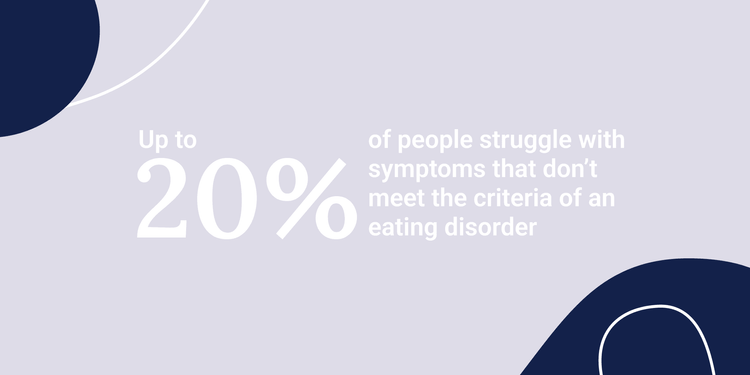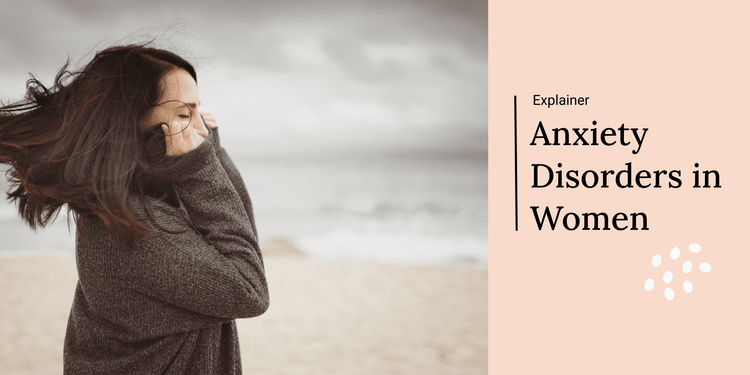
Binge eating disorder is the most common eating disorder in the United States and is typically diagnosed in young women.
In this article, we'll cover:
- What is binge eating disorder?
- How common is binge eating disorder in women?
- What are the signs and symptoms of binge eating disorder in women?
- What are the causes and risk factors for developing binge eating disorder?
- How does binge eating disorder affect a women's health?
- What therapies are available for binge eating disorder?
- Are there gender-specific treatments for binge eating disorder?
This is a living article. The wmnHealth team will update it as new information becomes available.
What is binge eating disorder?
Binge eating disorder (BED) is a serious mental health condition affecting millions globally. It is characterized by recurrent episodes of binge eating, during which a person consumes a large amount of food in a short time and feels a lack of control over their eating. Binge eating is often accompanied by feelings of shame, guilt, and distress, which can lead to a cycle of binging.
In contrast to people who overeat occasionally, people with BED typically eat much more food in a similar period. They may eat when they are not hungry. And they may also eat alone because they feel ashamed of their eating habits.
How common is binge eating disorder in women?
BED is the most common eating disorder in the United States. It affects both men and women, but it is more common in women, with prevalence estimates of 3.5% in women and 2% in men. BED is usually first diagnosed in young adulthood. BED is also more common in people with obesity. It affects women of all races and ethnicities.
What are the signs and symptoms of binge eating disorder in women?
BED can be challenging to spot, partly because those who engage in binge-eating episodes hide their behavior due to embarrassment or shame.
Some common signs and symptoms of BED include:
- eating unusually large portions of food
- feeling a lack of control over eating
- eating rapidly or secretly
- experiencing guilt, shame, or distress after eating.
There are gender differences in the symptoms of BED. In one U.S. study, more women than men reported feeling they cannot control what or how much they eat, whereas more men said overeating was their main symptom of BED.
Unlike bulimia nervosa, another eating disorder characterized by binge-eating episodes, people with BED do not purge, fast, or exercise excessively after overeating. However, experts are concerned that people with BED, among other eating disorders, may seek out new diabetes drugs like Ozempic, which are being used off-label for weight loss.
What are the causes and risk factors for binge eating disorder?
The cause of binge eating disorder is unknown, but is likely a complex interplay of psychological, genetic, and environmental factors.
Some people with BED may have a history of trauma, abuse, or neglect, while others may struggle with low self-esteem, anxiety, or depression. Genetics may also play a role, as people with a family history of eating disorders or other mental health conditions may be more likely to develop BED.
Researchers are still investigating the biological, psychological, and social factors contributing to BED in women. However, the following risk factors for BED have been identified:
Family history: One of the primary risk factors for developing BED in women is a family history of eating disorders. This may be due to a combination of genetic and environmental factors.
Childhood trauma or abuse: Another risk factor for developing BED in women is childhood trauma or abuse. Research has shown that individuals who experience trauma or abuse during childhood are more likely to develop mental health disorders, including eating disorders, later in life. Childhood trauma can also lead to low self-esteem, another risk factor for BED.
Mood disorders: Depression and anxiety are common risk factors for developing BED in women. These mental health conditions can lead to emotional eating and a loss of control over food.
Weight stigma or discrimination: Women who experience weight stigma or discrimination are also more likely to engage in binge eating behaviors.
Sociocultural factors: Sociocultural factors, such as the expectation that women should be thin and fit, can lead to body dissatisfaction, dieting, and disordered eating, triggering binging episodes. Diet culture can also harm women's mental health and contribute to the development or maintenance of BED.
Pregnancy: Pregnancy can raise the risk for binge eating disorder in women who are at higher risk for eating disorders. In one study, 1 out of every 3 people reported loss-of-control eating, a core feature of binge eating, during pregnancy. Another showed that almost half of the women with binge eating disorder got the condition during pregnancy. BED was driven by psychological, social, and weight-related factors, and traumatic life events.
How does binge eating disorder affect a women's health?
Many women with binge eating disorder are overweight or obese, which puts them at risk for a variety of other serious health conditions. If untreated, BED can have physical and mental health consequences. For example, people with BED may experience weight gain, high blood pressure, and Type 2 diabetes. In terms of mental health, they may also struggle with low self-esteem, social isolation, and other problems like depression and anxiety. In fact, in a national U.S. study, up to 23% of individuals with BED had attempted suicide, and the vast majority (94%) reported mental health symptoms during their lifetime.
What therapies are available for binge eating disorder?
There are a variety of effective therapies to help women overcome BED. In fact, research shows that cognitive-behavioral and interpersonal therapy — two forms of talk therapy widely used to treat BED — have a recovery rate of greater than 60% in the two years after treatment.
BED treatment typically involves a combination of psychological, behavioral, and pharmaceutical therapies.
Cognitive-behavioural therapy (CBT): CBT is a talk therapy that focuses on changing negative thought patterns and behaviors. It can help people with BED learn to recognize and alter their disordered eating habits and is the preferred treatment.
Interpersonal therapy (IPT): IPT is another type of talk therapy that helps individuals understand the role of mood and interpersonal relationships in BED and improve their communication with others.
Dialectical behavioral therapy (DBT): DBT focuses on developing mindfulness and improving emotion regulation and interpersonal relationships.
Medications: The U.S. Food and Drug Administration has approved a single drug, lisdexamfetamine dimesylate (Vyvanse®), to treat moderate to severe BED. Other drugs, such as antidepressants, may help manage symptoms associated with BED. As with any medication, these drugs have potential side effects and should be prescribed by a doctor.
Nutritional counseling: Registered dietitians may also assist people with BED with weight loss and developing healthy eating habits.
Self-help strategies: Besides professional treatment, several self-help strategies may be used to manage BED. These strategies include keeping a food diary, practicing mindfulness and relaxation techniques, and engaging in regular physical activity.
Are there gender-specific treatment approaches for binge eating disorder in women?
There are no gender-specific treatments for BED in women. However, healthcare providers should tailor treatments to address the unique challenges and experiences faced by women with the disorder. For example, women may be more likely to experience body dissatisfaction and feel pressure to conform to societal expectations of thinness. Therapies can help women build a positive body image and sense of self-worth not tied to their weight or appearance.
Resources
If you or a friend or family member are coping with an eating disorder, get support by contacting:
Canada: National Eating Disorder Information Centre 1-866-NEDIC-20 (toll-free) or 416-340-4156 (Toronto)
USA: National Eating Disorders Association (NEDA) Helpline; 1-800-931-2237.
Subscribe to our newsletter
Get a weekly roundup of articles, inspiration, and brain health science in your inbox. Subscribe now.


